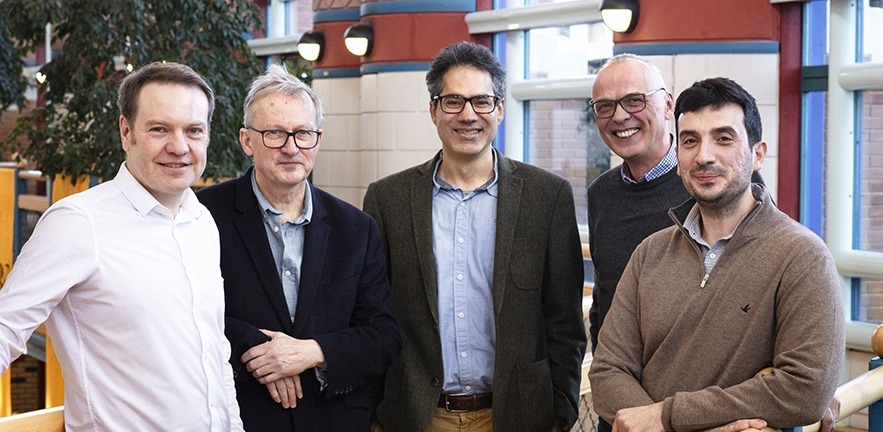How ageing societies can afford healthcare for all and reform an organisational system that has not kept pace with technology.

In this episode, joining podcast host Michael Kitson, University Senior Lecturer in International Macroeconomics at Cambridge Judge Business School, are Cambridge Judge faculty Kamal Munir, Reader in Strategy & Policy; Stefan Scholtes, Dennis Gillings Professor of Health Management; Aris Oraiopoulos, University Lecturer in Operations Management; and Paul Tracey, Professor of Innovation & Organisation.
This is the 11th in a series of “Cambridge Judge Business Debate” podcasts featuring faculty and others associated with Cambridge Judge Business School and the broader Cambridge community.
This latest podcast focuses on healthcare policy – how can ageing societies pay for healthcare, reform a hospital system highly resistant to change, and develop new medicines in a cost-efficient manner.
Here is an edited transcript of some of the podcast discussion:
Can the private sector provide the cure?
Michael Kitson: “One key benefit of economic growth is that people are living longer, but this demographic change is increasing pressures on healthcare systems throughout the world. There is the issue of funding: should the consumer pay directly for healthcare at the point of use, should it be paid through the insurance market, or should healthcare be publicly funded through the tax system? And can the private sector and market mechanisms do more to improve the efficiency of the healthcare system?”
Kamal Munir: “We can’t simply look at the private sector and say they can wave a magic wand, as there are bad managers in the private sector as well. Similarly, there are well-run hospitals in the public sector, and not-so-well run hospitals in the private sector. So we can’t just look to the private sector to come and fix the problem.”
Stefan Scholtes: “There are very few examples where private intervention has really benefited hospitals. Competition can be very powerful, but in healthcare it has a relatively small place. I think it can work where you have services that are really straightforward, have clearly defined outcomes, and are easily measurable.”
Paul Tracey: “When you deal with publicly funded sectors like healthcare, when you bring in ideas and structures and practices from the private sector and try to infuse them into organisations that have been publicly owned for a very long time, you’re introducing a lot of complexity and that can be very expensive and inefficient. Because the ideas may not be compatible, you introduce a whole lot of tensions. This isn’t unique to healthcare – you can look also at the railways.”
Kamal Munir: “You cannot expect hospitals to be the level at which you will get all these efficiency benefits – the efficiencies have to be generated at the central level. If you look at the cost leaders in the private sector that we teach as case studies, they generated efficiencies at the central level and pass these on to units.”
A sector resistant to change
Stefan Scholtes: “I’ve always been gobsmacked by the stubbornness of the organisation of healthcare in an industry that is dominated by incredible innovation. If you look at the technology, there has been unbelievable progress, with life expectancy increasing by three months every single year. But if you look at how we deliver healthcare it’s the same as 50 years ago – it’s dominated by doctors, it’s run by doctors, and the dominating organisations are hospitals everywhere in the world.”
Michael Kitson: “What would a reconfigured healthcare system look like?”
Stefan Scholtes: “Slimming down hospitals to their focus – to look at serious emergency cases, patients who might need intensive care or general anaesthetics, and difficult surgeries. These may be 30 to 40 per cent of the activity that goes on in hospitals these days, and everything else could be delivered elsewhere if there is a landing place for it, and a willingness by the doctors and the professions to actually think outside the box.”
Data can transform the doctor-patient relationship
Aris Oraiopoulos: “When we talk about technology and data, one aspect in this discussion is about who should be making decisions on this. The data is somewhere out there but we don’t have access to it, and costs could go down if we could share that data.”
Stefan Scholtes: “When the information is with the doctor, they are the powerful player; when the data is with me that will change the equation. There’s a change going on, and we’re just now at the cusp of it.”
Paul Tracey: “Digital technology can sometimes exacerbate inequality, as people can be excluded, so we need to be mindful of this. But preventative medicine is an area where digital technology can really help, and where significant cost cuts will be.”
Aris Oraiopoulos: “Last year, 2018, was a landmark year. The FDA (the US Food and Drug Administration) approved the first fully autonomous AI diagnostic device, dealing with diabetes, that doesn’t require intervention by doctors, and a lot of patients feel more comfortable using this.”
Can Artificial Intelligence help discover new drugs? Watch this space
Aris Oraiopoulos: “AI is an area where there’s a lot of hype: AI has in some ways revolutionised the drug development process, but as to discovering new drugs there’s simply nothing that has entered clinical trials as a result of AI software. There’s a barrier for AI: doctors want to understand what’s happening, and at the moment AI is still operating in a very non-transparent way – we get an answer but we don’t really see why the software arrives at that answer, and that makes doctors uncomfortable.”
What single change would most improve healthcare in the next 10 or 15 years?
Stefan Scholtes: “To take it out of the political sphere and give people time to change. All the examples where good transformation has occurred are long-term, 10-year-plus projects where willing people have really come together relatively uninterrupted by constant political interference.”
Paul Tracey: “Political interference has been highly problematic, and more broadly there needs to be an acceptance that more resource is needed.”
Kamal Munir: “I’d like to emphasise the preventative paradigm more. We need to start viewing the whole thing as a holistic problem – the nature of work itself is changing, as sedentary lifestyles are causing more muscular-skeletal problems.”
Aris Oraiopoulos: “Digital technology is bound to play a role in decreasing the cost and increasing efficiency. A change is happening, but it’s not going to happen overnight.”


